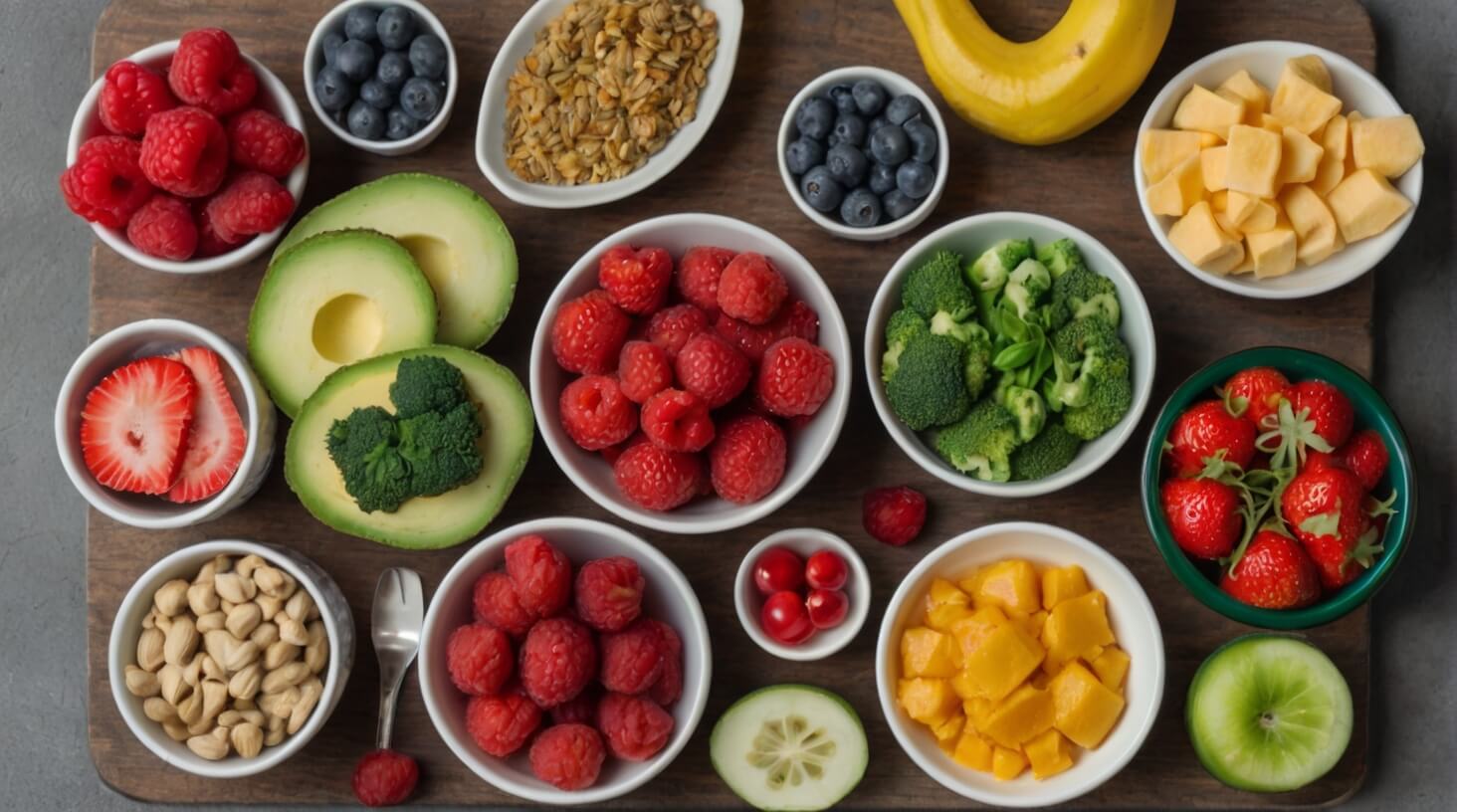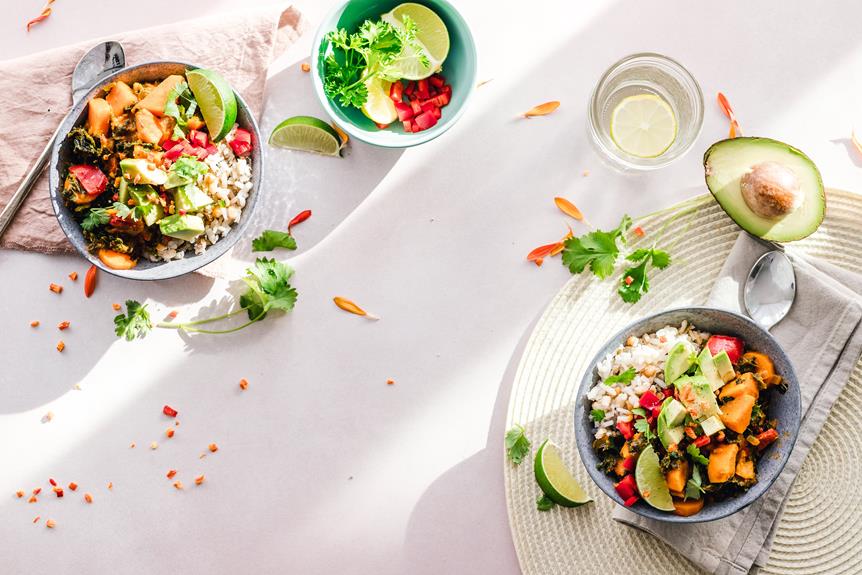While your body harnesses inflammation to heal a scraped knee or fight off a cold, this same protective response can quietly linger and become your silent adversary, contributing to chronic diseases that plague your health. As you sit down to your next meal, consider the powerful influence your dietary choices have on controlling this internal fire. The foods you consume can either fuel the flames of inflammation or help extinguish them. You’re often told about the benefits of eating more fruits and vegetables, but perhaps you’re not fully aware of the reasons why—or how certain foods might be undermining your health without you even realizing it. Stay tuned to uncover which foods to embrace and which to avoid, and how a thoughtful approach to your diet can be a cornerstone in safeguarding your long-term wellbeing.
Key Takeaways
- Chronic inflammation is triggered by lifestyle factors like poor diet, smoking, or stress.
- An anti-inflammatory diet focuses on whole grains, lean proteins, and a colorful array of fruits and vegetables.
- Implementing dietary changes lowers the risk of developing chronic conditions.
- Regular physical activity, restful sleep, stress management, and moderate alcohol intake are important aspects of a healthy lifestyle that can help manage inflammation.
Understanding Chronic Inflammation
Chronic inflammation acts as a slow-burning fire in your body, often triggered by lifestyle factors like poor diet, smoking, or stress, and it can cause lasting damage to your cells and tissues. This persistent state not only contributes to the development of various chronic diseases but also exacerbates symptoms in those already battling an inflammatory or autoimmune disease.
You might not immediately notice chronic inflammation, as its markers of inflammation are insidious, unlike the acute redness and swelling from a fresh injury. However, when inflammation persists, it can lead to a breakdown of healthy bodily functions. The causes of inflammation are varied, including environmental toxins and obesity, but lifestyle choices play a significant role. For example, chronic stress is a well-known culprit that elevates your body’s levels of inflammation through prolonged exposure to stress hormones.
To reduce inflammation, an anti-inflammatory diet is key. Diets high in processed meats, saturated fats, and refined sugars—known contributors to metaflammation—should be replaced with nutrient-rich foods. An anti-inflammatory diet focuses on whole grains, lean proteins, and a colorful array of fruits and vegetables. These foods are packed with fiber and phytochemicals that combat oxidative stress and lower inflammatory markers.
Implementing such dietary changes not only lowers your risk of developing chronic conditions but also aids in managing existing ones. By understanding what causes inflammation and taking practical steps to mitigate it, you can protect and improve your health, as well as the well-being of those you serve. Remember, tackling chronic inflammation with an anti-inflammatory diet isn’t just about reducing symptoms—it’s about promoting long-term health resilience.
Anti-Inflammatory Foods Explained

Now that we’ve established the role of diet in managing inflammation, let’s explore the specific foods that can help quell this internal fire and support your body’s health. Anti-inflammatory foods are key in combating chronic inflammation, which can lead to various health issues. By emphasizing the consumption of colorful fruits and vegetables, you’re not just adding vibrancy to your plate but also packing it with antioxidants and phytonutrients that fight inflammation.
Whole grains and legumes are your allies, providing fiber that helps in reducing inflammatory markers. Including these in your diet can also support healthy digestion and maintain steady blood sugar levels. Healthy fats, particularly those rich in mono and polyunsaturated fats, like those found in olive oil and fish like salmon, are potent anti-inflammatory agents. The Mediterranean diet, renowned for its emphasis on plant-based foods, olive oil, and fish, stands as a testament to the effectiveness of these foods in maintaining overall health.
Incorporating green leafy vegetables into your meals not only offers essential vitamins and minerals but also serves as an excellent anti-inflammatory choice. A day of anti-inflammatory eating doesn’t have to be dull; think oatmeal with blueberries to start, followed by a whole grain tortilla packed with pinto beans and zucchini, and a dinner of quinoa and skinless chicken tabbouleh bowls.
Foods That Exacerbate Inflammation
While certain foods can help fight inflammation, others like refined carbohydrates and fried treats have the opposite effect, often exacerbating the body’s inflammatory response. It’s crucial to be mindful of these items in your diet, especially if you’re committed to serving others by promoting health and wellness.
Here are four types of foods known to increase inflammation:
- Refined Carbohydrates: Foods made with white flour, such as white bread and pastries, can drive inflammation. These high-glycemic index foods can spike blood sugar levels and kick-start an inflammatory cascade within your body.
- Fried and Processed Foods: Regular consumption of fried delights, including French fries, and processed snacks can contribute to inflammation. The trans fats found in many of these foods are known culprits of inflammation and are best avoided for optimal health.
- Sugar and Sweetened Beverages: Excessive intake of sugar, often found in sodas and other sweetened drinks, is a significant inflammatory agent. It’s wise to limit these beverages and instead hydrate with water or herbal teas.
- Red and Processed Meats: Foods like red meat and processed meats, including hot dogs and other deli items, are associated with increased inflammation. These foods can also contribute to chronic diseases when consumed in large quantities over time.
Sample Anti-Inflammatory Meal Plan

Understanding the types of foods that increase inflammation, let’s explore a day in the life of an anti-inflammatory diet that you can easily incorporate into your routine for better health. Embracing foods rich in nutrients and anti-inflammatory effects can help you reduce your risk of chronic conditions and promote a healthy lifestyle.
For breakfast, imagine starting your day with oatmeal topped with a generous serving of blueberries. This meal provides you with whole grains and antioxidants that set a positive tone for the day. Lunch could be a colorful whole grain tortilla wrap filled with pinto beans and an assortment of vegetables, offering a satisfying mix of fiber and nutrients. Dinner might feature quinoa and chicken tabbouleh, a dish that combines protein with an array of vegetables for a balanced end to your day.
Here is a sample anti-inflammatory meal plan to guide you:
| Meal Time | Dish | Key Components |
|---|---|---|
| Breakfast | Oatmeal with Blueberries | Whole grains, Antioxidants |
| Lunch | Whole Grain Tortilla with Beans and Veggies | Fiber, Vegetables, Legumes |
| Dinner | Quinoa and Chicken Tabbouleh | Protein, Vegetables, Whole grains |
To complement this meal plan, remember that healthy eating is just one aspect of a healthy lifestyle. Moderate alcohol consumption, such as a glass of red wine, can have potential antioxidant benefits. However, it’s crucial to supplement your diet with daily exercise, quality sleep, non-smoking, and stress reduction strategies.
Complementing Diet With Lifestyle Choices

To maximize the benefits of an anti-inflammatory diet, it’s essential to integrate regular exercise, ensure restful sleep, and employ stress management techniques. Complementing your healthy diet with these lifestyle choices creates a holistic approach that can significantly reduce inflammation and the risk of chronic diseases. Here’s how you can enrich your diet with lifestyle habits that serve your well-being:
- Engage in Regular Physical Activity: Aim for at least 150 minutes of moderate-intensity exercise each week. This can help manage weight gain, boost your immune system, and decrease the risk of heart disease and type 2 diabetes.
- Prioritize Sleep: Ensure you’re getting 7-9 hours of quality sleep per night. Sleep is when your body recovers, and lack of it can contribute to inflammation and obesity.
- Reduce Stress: Chronic stress can trigger inflammation. Techniques such as meditation, deep breathing, and yoga can help manage stress levels.
- Moderate Alcohol Intake: While moderate consumption of red wine has antioxidants, excessive intake can be inflammatory. Limit consumption to the recommended one glass per day for women and two for men.
Incorporating foods like green leafy vegetables and oily fish into your meals provides essential nutrients that support these lifestyle choices. For instance, the omega-3 fatty acids found in oily fish are known for their anti-inflammatory properties. Similarly, green leafy vegetables are high in vitamins and minerals that support overall health and can help prevent conditions like Alzheimer’s disease.











